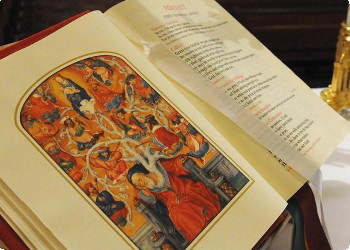Why do you speak to them in parables?
13 JULY (Mt 13,1-23)
Jesus uses the parable to convey an eternal, everlasting truth, not made of abstract concepts, but on concrete images. Philosophies pass, theologies pass and systems of thought and ideologies fade. The parable remains forever. Its language is always present. It is as if Jesus told it today, right now, in this particular historical juncture.
It is up to a man the freedom to enter into its deepest mystery, or stay on the surface. Who walks with humility, letting himself be led by the Spirit of God, enters into the depths of truth and perceive all its divine and human beauty. On the contrary, who is ruled by pride and spiritual arrogance, stays afloat, he sees something, but without coming close to the truth. He goes away empty handed, because his heart is filled with thoughts of sin and vice. For these the doors of the kingdom are closed. They remain in worldliness, paganism, idolatry and impiety. Pride is a real obstacle to the truth of God.
The pride cannot stop the journey of God in history. He cannot prevent it to be carried out. The Lord bypasses the human obstacles of sin with his divine wisdom and intelligence, using a simple language that is rejected by the learned and wise men according to the flesh. They are not given to know the kingdom of God. It is not given because they are the ones to put themselves out. Their attitude, their closure reveal it. Never does God give his word to a heart that refuses, rejects, tramples and uses it to do evil to those who offer it in his name and with his authority.
On that day, Jesus went out of the house and sat down by the sea. Such large crowds gathered around him that he got into a boat and sat down, and the whole crowd stood along the shore. And he spoke to them at length in parables, saying: “A sower went out to sow. And as he sowed, some seed fell on the path, and birds came and ate it up. Some fell on rocky ground, where it had little soil. It sprang up at once because the soil was not deep, and when the sun rose it was scorched, and it withered for lack of roots. Some seed fell among thorns, and the thorns grew up and choked it. But some seed fell on rich soil, and produced fruit, a hundred or sixty or thirtyfold. Whoever has ears ought to hear.” The disciples approached him and said, “Why do you speak to them in parables?” He said to them in reply, “Because knowledge of the mysteries of the kingdom of heaven has been granted to you, but to them it has not been granted. To anyone who has, more will be given and he will grow rich; from anyone who has not, even what he has will be taken away. This is why I speak to them in parables, because ‘they look but do not see and hear but do not listen or understand.’ Isaiah’s prophecy is fulfilled in them, which says: ‘You shall indeed hear but not understand you shall indeed look but never see. Gross is the heart of this people, they will hardly hear with their ears, they have closed their eyes, lest they see with their eyes and hear with their ears and understand with their heart and be converted, and I heal them.’ “But blessed are your eyes, because they see, and your ears, because they hear. Amen, I say to you, many prophets and righteous people longed to see what you see but did not see it, and to hear what you hear but did not hear it. “Hear then the parable of the sower. The seed sown on the path is the one who hears the word of the kingdom without understanding it, and the evil one comes and steals away what was sown in his heart. The seed sown on rocky ground is the one who hears the word and receives it at once with joy. But he has no root and lasts only for a time. When some tribulation or persecution comes because of the word, he immediately falls away. The seed sown among thorns is the one who hears the word, but then worldly anxiety and the lure of riches choke the word and it bears no fruit. But the seed sown on rich soil is the one who hears the word and understands it, who indeed bears fruit and yields a hundred or sixty or thirtyfold.”
God wants the salvation of all. For all he sent his Word from Heaven. For all he gave his Only Son. For all he made a gift of the Holy Spirit. But who really benefits from these divine gifts? Who makes really a treasure of it? Only the good soil. Only it receives the Word and brings it to fruiting. Never might the word reach maturity in other soils. Te ideal conditions for it to bear fruit for eternal life do not exist. Truly the Lord is not responsible for those who are lost.
Virgin Mary, Mother of the Redemption, Angels and Saints make us humble and pure at heart.





